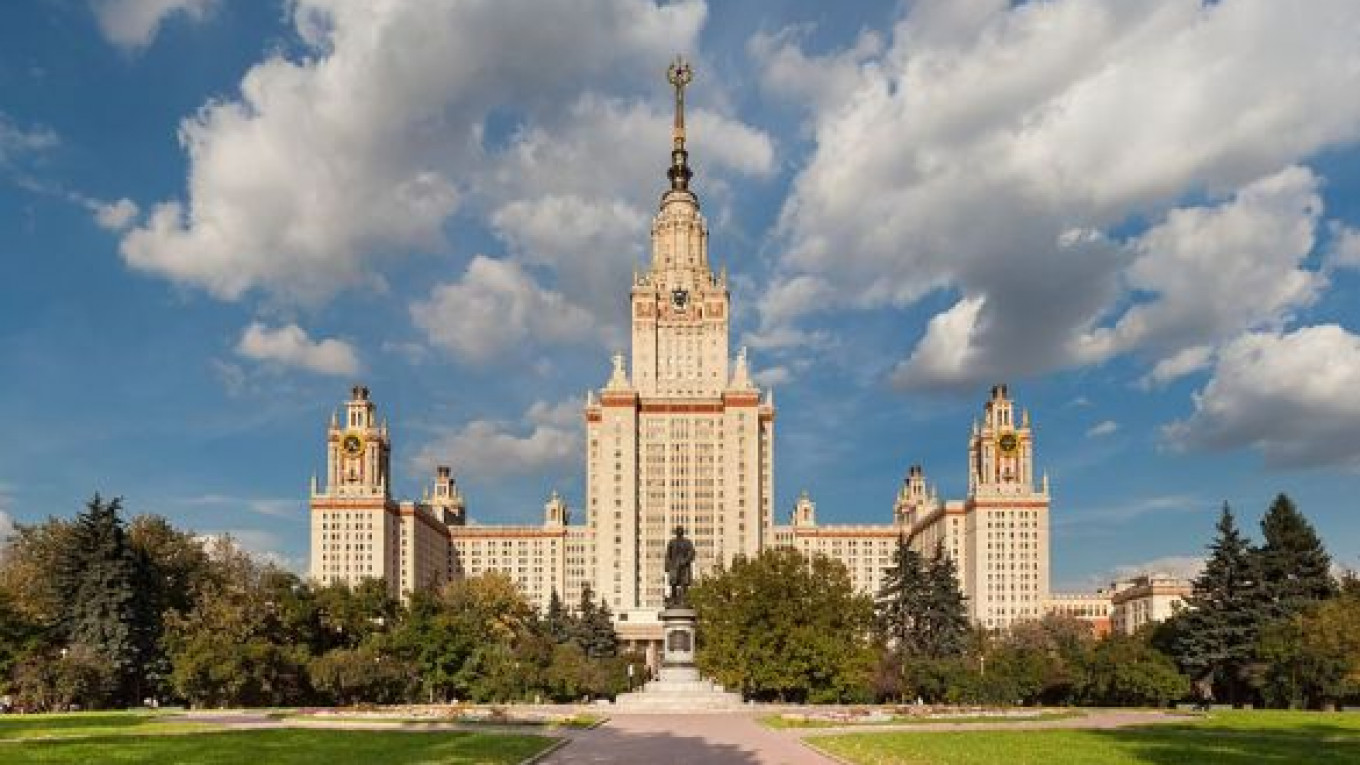Federal labor inspectors say numerous legal violations were uncovered in dismissals of Moscow State University professors, ostensibly linked to a Kremlin decree to raise salaries for professors and the government's subsequent failure to finance such raises.
The decree was part of a long-anticipated campaign to increase conditions for teachers and professors, a goal that was named a social priority by President Vladimir Putin earlier this year. Before his return to the Kremlin last year, Putin promised to double salaries for teachers and doctors by 2018.
Yet, in what some professors say is a direct result of that goal, the Federal Labor and Employment Service, or Rostrud, said in a statement published by Interfax on Sunday that it had detected "multiple violations linked to the procedure of firing workers and counting payments."
The unplanned inspection by the Federal Service for Labor and Employment was apparently triggered by complaints of dozens of MSU professors in mid-November about what they called "mass dismissals," which they linked to Putin's decree in May 2012 to raise the salaries of university professors. In accordance with the decree, the state budget is supposed to provide the financial means for such pay raises.
Several professors said in their open letter to Putin that the university never received additional funding, however.
"The government has obligated Moscow State University to increase the average salary of employees, but it has not provided the appropriate means to do so," the letter said.
In response to the open letter, Education and Science Minister Dmitry Livanov ordered the state education watchdog, Rosobrnadzor, to look into the allegations of dismissals, but called the claim that the university had not received additional funding "inaccurate."
No findings by Rosobrnadzor have been published.
However, Mikhail Lobanov, one of the letter's authors and chairman of the "University Solidarity" trade union branch for MSU professors, said the federal labor inspectors' findings confirmed "a process that can lead to mass dismissals" at the university.
Lobanov said by phone that the dismissals mentioned by Rostrud and others mentioned in the letter to Putin were "the direct result of one thing — a disparity of funding and plans for salaries."
Employees of MSU's Mass Media Center, set for liquidation, the Editorial Board of Real-Time Radiobroadcasting and Center for Intensive Learning of Foreign Languages, "were not informed on time about the looming dismissals" and not given the opportunity to sign their dismissal orders, Rostrud said.
The state agency did not say how many MSU professors had been dismissed illegally, in what period or why. Labor inspections were continuing at the university as of Sunday afternoon, Rostrud said.
Authors of the November letter said there had been dozens of dismissals since September at MSU's other departments, including in the math and mechanics and biological faculties, though they apparently did not know at that time that three more departments were involved as well, Lobanov said.
Vyacheslav Goryachko, an aide to MSU's rector Viktor Sadovnichy, denied that employees of the three departments named by federal labor inspectors were fired with violations, however.
"For our part, everything was done in line with the law," Goryachko told Interfax, saying MSU's Mass Media Center and Editorial Board of Real-Time Radiobroadcasting were undergoing a restructuring process.
"All the employees were informed; everybody was invited to a meeting. We offered to participate in work for the new structure but no one showed up for the meeting," Goryachko said.
Those who later volunteered to continue work in the new structure will do so, he said, while the others resigned of their own free will.
Lobanov called Goryachko's denial of the dismissals "weird," saying that "nobody wants to take responsibility for the dismissals."
Sadovnichy said in mid-November that no professors had been fired and no dismissals were planned for the near future. At that time, Sadovnichy implied that the authors of the open letter to Putin were part of a group of chronically dissatisfied university employees.
Some 850 people, including 180 MSU professors, professors of other universities and students of various universities, had signed the letter to Putin as of Nov. 26, and 579 of them had authorized the publication of their identities.
Putin ordered the government in May 2012 to raise salaries for university professors to 200 percent of the average regional salary by 2018 and allocate additional state funds for the raises. In December, the government spelled out gradual increases of professors' salaries but, according to the open letter, failed to provide "enough funds" for increases in 2013 or any "additional funds" for increases in 2014.
In early July, MSU rector Viktor Sadovnichy issued a decree ordering the salaries of professors and researchers at the university to be raised to 65,000 rubles ($1,980) in 2013 and 75,000 rubles ($2,300) in 2014. Both sums are higher than the average regional salary.
In mid-November, Sadovnichy said that MSU had raised the average professor's salary to more than 70,000 rubles ($2,140) a month and that various bonuses and grants were given out regularly to staff.
Contact the author at [email protected]
A Message from The Moscow Times:
Dear readers,
We are facing unprecedented challenges. Russia's Prosecutor General's Office has designated The Moscow Times as an "undesirable" organization, criminalizing our work and putting our staff at risk of prosecution. This follows our earlier unjust labeling as a "foreign agent."
These actions are direct attempts to silence independent journalism in Russia. The authorities claim our work "discredits the decisions of the Russian leadership." We see things differently: we strive to provide accurate, unbiased reporting on Russia.
We, the journalists of The Moscow Times, refuse to be silenced. But to continue our work, we need your help.
Your support, no matter how small, makes a world of difference. If you can, please support us monthly starting from just $2. It's quick to set up, and every contribution makes a significant impact.
By supporting The Moscow Times, you're defending open, independent journalism in the face of repression. Thank you for standing with us.
Remind me later.






